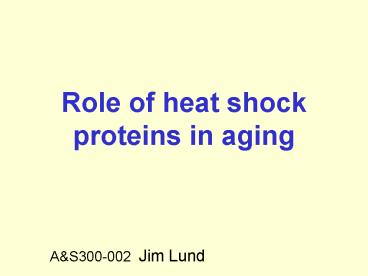Role of heat shock proteins in aging - PowerPoint PPT Presentation
Title:
Role of heat shock proteins in aging
Description:
Heat shock Heavy metals Oxidative stress Also called HSPs, cellular stress proteins and molecular chaperones. ... Bacteria, vertebrates, plants. – PowerPoint PPT presentation
Number of Views:272
Avg rating:3.0/5.0
Title: Role of heat shock proteins in aging
1
Role of heat shock proteins in aging
- AS300-002 Jim Lund
2
Stress resistance genes
- Antioxidant proteins.
- SOD, catalase, GSH, thioreductin
- Heat shock proteins.
- HSPs, HSP16s, HSP70s
- Innate and acquired immunity genes.
- Antibacterial, antifungal
3
Heat shock proteins
- Initially discovered in Drosophila as proteins
induced in response to culturing flies at high
temperatures. - (Ashburner and Bonner, 1978)
- Now known to be ubiquitous.
- Bacteria, vertebrates, plants.
4
Heat shock proteins
- Induced in response to many stressors.
- Heat shock
- Heavy metals
- Oxidative stress
- Also called HSPs, cellular stress proteins and
molecular chaperones.
5
Heat shock protein function
- Chaperones help newly synthesized proteins fold.
- Protect proteins from cellular stresses that can
cause unfolding and aggregation. - Target proteins to degradation, prevent and clean
up protein aggregates.
6
Cellular roles of HSPs
Macario el al., 2005
7
HSP complexes
Macario el al., 2005
8
Heat shock protein function
- Present normally in cells.
- Stress increases levels of unfolded proteins,
makes aggregates more likely to form. - Stress increases levels of HSPs.
- Both transcriptional and post-transcriptional
mechanisms. - Total levels of protein synthesis in the cell
inhibited by stress.
9
HSP response to stress
Verbeke et al., 2001
10
Heat shock induction declines with age
- Cells in young animals rapidly alter levels of
HSPs. - Older animals lose the ability to induce HSPs and
other stress response proteins. - Observed in yeast, worms, flies, and mouse and
human cell lines.
11
Transcriptional control of HSPs
- Heat shock factors (HSF)
- Major transcription factors responsible for
stress-induced HSP expression - HSF1 and HSF4 (hsf-1 in C. elegans)
- Responsible for stress-induced HSP expression.
- HSF2 responsible for developmental regulation of
heat shock proteins. - HSF3, avian specific.
- HSF1 is the best studied HSF.
12
HSF functions
Pirkkala et al., 2001
13
Induction of HSP70 in hepatocytes
Heydari, et al., 2000
14
Age-related changes in HSF1
- In rat hepatocytes, the regulation of HSF70 by
HSF1 was studied. - HSF1 induces HSP70 in cells from young rats, but
HSP70 is only weakly induced in cells from old
rats. - HSF1 loses ability to bind the HSP70 promoter in
old cells. - HSF1 undergoes post-transcription modification
that alters promoter binding.
15
HSP overexpression can extend lifespan
- Hsp22 (a mitochondrial HSP) overexpression can
extend lifespan in Drosophila. - Ubiquitous or targeted expression in
motorneurons 30 lifespan extension. - (Kurapati et al., 2000)
- Drosophila lines selected for longevity.
- Hsp22 2X - 10X higher expression relative to
control outbred lines. - Hsp23 also significantly overexpressed.
- (Kurapati et al., 2004)
16
Mitochondrial HSPs
- Overexpression of HSPs in mitochondria.
- Decreases production of free radicals.
- Increases mitochondrial efficiency.
- May be a mechanism by which HSP overexpression
leads to longevity.
17
HSP overexpression can extend lifespan
- HSP16 in the worm is not expressed in young
worms, but expressed in old (16 days old) worms. - Overexpression of HSP16 extends lifespan.
- Depends on DAF-16.
- Thermotolerance also increased.
- Walker and Lithgow 2003
18
Thermotolerance is increased in C. elegans Daf
mutants
19
DAF-16 and HSPs
- HSP70 and HSP90 expression is also dependent on
DAF-16 (Forkhead family transcription factor)
expression. - Munox et al., 2003
20
HSP16 transgenics 15 lifespan
21
HSF-1 expression affects lifespan
- C. elegans hsf-1 knockout has reduced lifespan.
- hsp-1 overexpression extends lifespan.
- Recall daf-2 has a long lifespan. hsf-1 is
required for daf-2 long lifespan. - Hsu et al., 2003
22
HSP and protein aggregation
- Protein aggregate formation is involved in the
development of neurogenerative disease. - ?-amyloid, tau,and polyglutamine protein
aggregate formation is slowed by HSPs - Overexpression of HSPs delayed aggregate
formation. - hsf-1 overexpression in C. elegans delays
formation of polyglutamine protein aggregates
(Hsu et al., 2003).
23
HSF transcription response
- Chromatin immunoprecipitation (ChIP) combined
with DNA microarrays was used to identify direct
trascriptional targets of HSF in yeast. - 3 of yeast genes identified as targets
- Protein folding and degradation
- Energy generation
- Protein trafficking
- Maintenance of cell integrity
- Small molecule transport
- Cell signaling
- Transcription
24
HSF activated genes
Hahn et al., 2004
25
HSF activated genes are stress induced
Hahn et al., 2004































